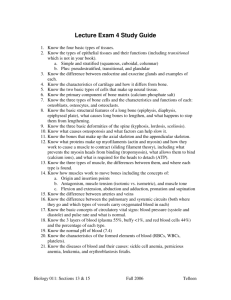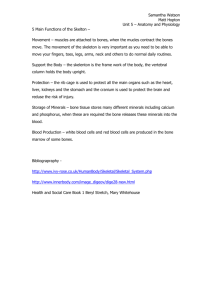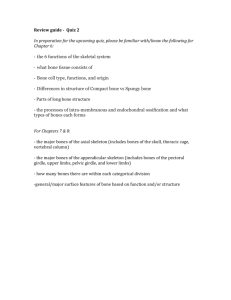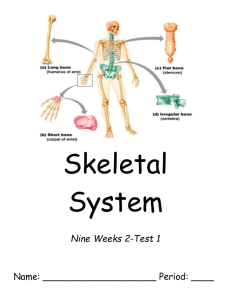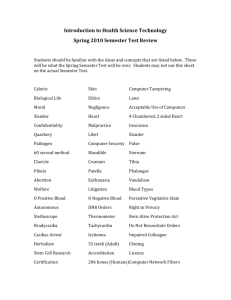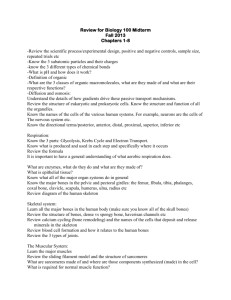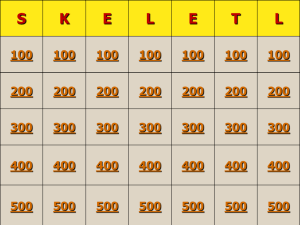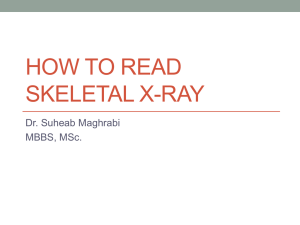006_Bones_Tissue
advertisement
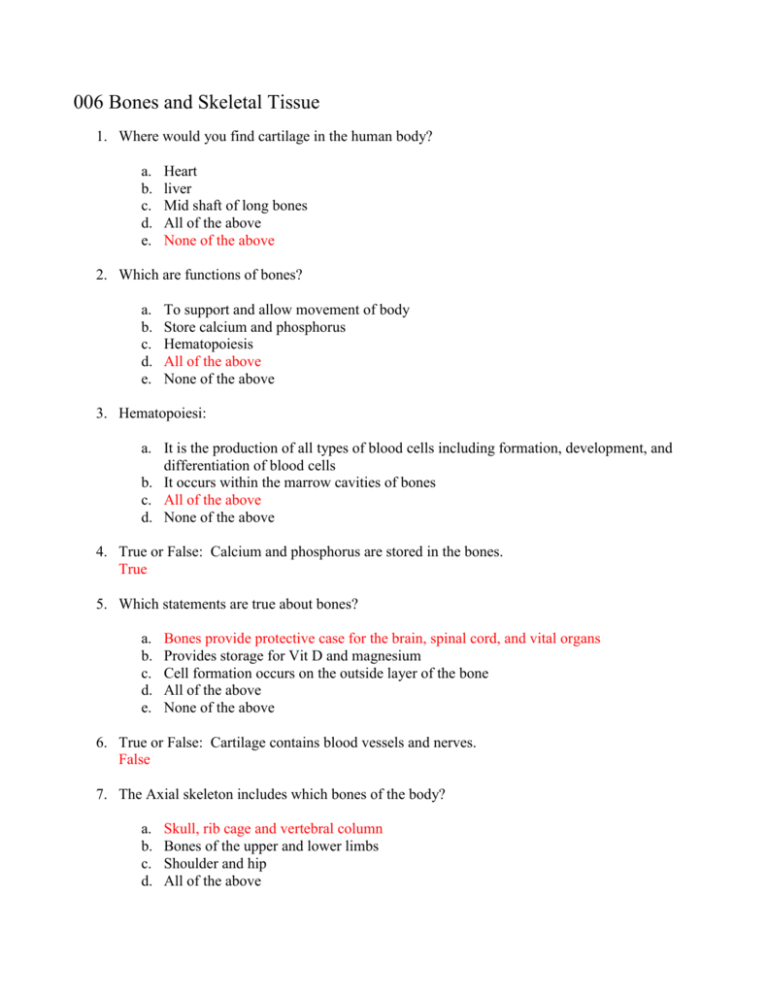
006 Bones and Skeletal Tissue 1. Where would you find cartilage in the human body? a. b. c. d. e. Heart liver Mid shaft of long bones All of the above None of the above 2. Which are functions of bones? a. b. c. d. e. To support and allow movement of body Store calcium and phosphorus Hematopoiesis All of the above None of the above 3. Hematopoiesi: a. It is the production of all types of blood cells including formation, development, and differentiation of blood cells b. It occurs within the marrow cavities of bones c. All of the above d. None of the above 4. True or False: Calcium and phosphorus are stored in the bones. True 5. Which statements are true about bones? a. b. c. d. e. Bones provide protective case for the brain, spinal cord, and vital organs Provides storage for Vit D and magnesium Cell formation occurs on the outside layer of the bone All of the above None of the above 6. True or False: Cartilage contains blood vessels and nerves. False 7. The Axial skeleton includes which bones of the body? a. b. c. d. Skull, rib cage and vertebral column Bones of the upper and lower limbs Shoulder and hip All of the above 8. True or False: The hand is part of the Appendicular skeleton. True 9. True or False: The skull is part of the Appendicular skeleton. False, Axial skeleton 10. There are different shapes of bones in the human body. They are: a. b. c. d. Long, flat, round, and tubular Long, flat,sesamoid, irregular, and short Short, flat, round, and oval Long, flat, sesamoid, irregular, and round 11. Osteoblasts are: a. b. c. d. Large cells that resorb or break down bone matrix Mature bone cells Unmineralized bone matrix Bone-forming cells 12. Calcium is necessary for: a. b. c. d. Muscle contraction and transmission of nerve impulses Blood coagulation Cell division All of the above 13. Link the words to their definition. a. _____non displaced 1. Bone ends are out of normal alignment b. _____displaced 2. The fracture is parallel to the long axis of the bone c. _____complete 3. Bone is broken all the way through d. _____incomplete 4. Bone ends retain their normal position e. _____linear 5. Bone is not broken all the way through 4, 1, 3, 5, 2 14. True or False: A Transverse fracture is an open fracture where both ends of the bone penetrate the skin. False—the fracture is perpendicular to the long axis of the bone 15. True or False: A displaced bone, the ends are out of normal alignment. True 16. True or False: The linear fracture is when both ends retain their normal position. False—the linear fracture is parallel to the long axis of the bone 17. True or False: The simple fracture, both ends do not penetrate the skin True 18. True or False: A crushed bone is a comminuted type fracture. False—Compression 19. A greenstick type of fracture: a. b. c. d. The bone portion is pressed inward Occurs when excessive twisting forces are applied to a bone Are common sports fracture Only one side of the shaft breaks, the other side bends 20. Which statement is true? a. b. c. d. By age 25, bone deterioration begins By age 25, nearly all bones are completely ossified By age 50, bones begin to diminish in size All of the above 21. Which of the conditions could result from insufficient calcium in the diet or by Vit D deficiency? a. b. c. d. e. Rickets & Osteomalacia Osteomalacia Bone cancer Paget’s Disease All of the above 22. Which statement is true about Rickets? a. b. c. d. e. The bones of children are inadequately mineralized causing softened, weakened bones Caused by insufficient calcium in the diet, or by vitamin D deficiency Characterized by bowed legs and deformities of the pelvis, skull, and rib cage All of the above None of the above 23. All the statements below are true, EXCEPT: a. b. c. d. Treatment of osteoporosis include weight-bearing exercise With advanced osteoporosis, the bones become so fragile that sneezing can cause a fracture The cause of Paget’s Disease is unknown Facial deformity is common with Rickets
